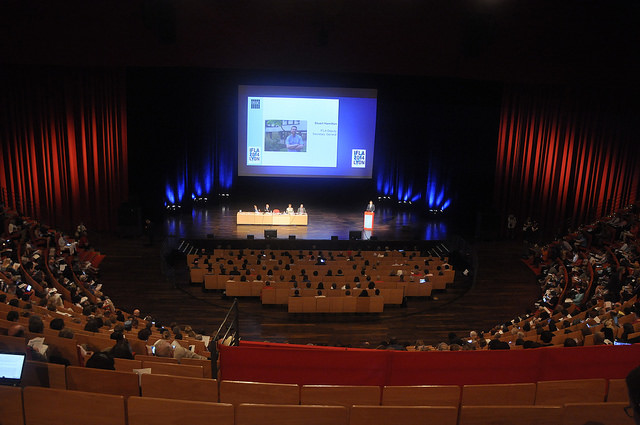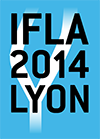
80th IFLA General Conference and Assembly
16-22 August 2014, Lyon, France
19 August 2014
Strong Libraries = strong societies: a declaration and debate
Русский | Español | العربية | Deutsch | français | 简体中文

Yesterday’s President’s Session was full of strong opinions about the importance of the libraries in the support of the freedom of knowledge and expression.
Launch of the Lyon Declaration
To understand the purpose of the Lyon Declaration, one should first have an understanding of the global context of the post 2015 Development Agenda. The Lyon Declaration on Access to Information is an advocacy document that clearly states the necessity to recognize access to information as a critical factor in the support of governments in achieving development goals and enabling citizens to make informed decisions to help improve their own lives. Libraries should play a major role in making such access easier and more efficient.
IFLA President Sinikka Sipilä and IFLA Deputy Secretary General Stuart Hamilton presented the context of the Lyon Declaration and the online tools useful for librarians to lobby in their institutions, all available on the dedicated website.
Bruno Racine, President of the National Library of France, explained clearly that the traditional mission of libraries in providing coherent access to collections is now reinforced by the necessity to provide users with the capacity to critically evaluate information. Mediation has perhaps become the most important mission of librarians; for example, the National Library of France has recently opened a number thematic documentation centers (sustainable development, entrepreneurship, etc.).
Gérard Collomb, Senator-Mayor of Lyon, President of Greater Lyon, highlighted the involvement of the City of Lyon in all the aspects of promoting the books and the cultural empowerment of citizens. 20% of the “cultural budget” of Lyon is devoted to public libraries, and the city also supports a number of festivals about various aspects of literature such as crime novels or comics. Gérard Collomb drew a very interesting parallel between the XVIth century humanist revolution and the numeric (data) revolution of today. Lyon has been an important center for humanist literature and has always welcomed technologic innovations.
The Lyon Declaration settles then within a coherent historical background.
Strong Libraries = Strong Societies: e-participation for strong information societies
After a comprehensive introduction from IFLA President Sinikka Sipilä, six speakers developed further on key aspects of the Presidential Theme. The speeches and the questions were moderated by Martyn Wade (Chair, FAIFE Committee).
IFLA Governing Board member Maria-Carme Torras I Calvo insisted on the fact that access to information cannot be separated from the capacity to analyze that information. Librarians must keep these two aspects in mind when developing new projects.
Catherine Lucet provided the publishers’ point of view and mentioned that it is important for librarians to keep in mind not only on the price of books and subscriptions, but also on the broader economic consequences of their purchases, especially for developing countries.
Anriette Esterhuysen gave a dynamic speech about the importance for librarians to lobby with their local and national political institutions. “Out your inner lobbyist!” she said to participants, who should move from their policy comfort zone and explore activism in Internet infrastructure, freedom of expression, censorship, and advocate for open data and open government.
Ernesto Hartikainen gave some successful examples of e-democracy in action in Finland from websites such as: Demokratia.fi, Kansalaisaloite.fi, Lausuntopalvelu.fi. English language versions of some these are also available.
Andy Richardson presented “Participation from the parliamentary perspective “. Participation in formal processes is challenging work in particular by traditional political parties’ crisis. To have an effective e-participation, people must have access to information. Andy Richardson gave the examples of Botswana speaks by which people can text messages to their representatives, and the parliamentary library of Chile which is developing a project of translation of law texts into more understandable language.
Martine Reicherts elaborated on two major decisions by the European Union:
- The “right to be forgotten” (digital anonymity), according to her is widely misunderstood, especially by media organizations. This right is not absolute; it must be balanced with freedom of expression and freedom of the press.
- The Union must also promote a single pan-European law for data protection; this is a real need for every European citizen. Recent surveys suggest that as much as 92% of European people are “very concerned” by the way personal data are collected and stored from mobile devises.
Questions after speeches were very interesting and showed how essential these themes are for librarians all over the world.
Last update: 19 August 2014


